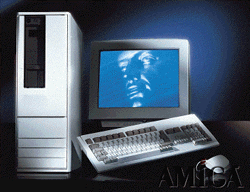
The Amiga Lives AgainBy David Adams
| The world's best selling home computer | |
| Ironically, one of the primary forces keeping the Amiga alive is hackers |
The Amiga was originally developed as a games platform in 1982 and was sold to Commodore in 1985. Commodore was high on its unexpected success with the Commodore 64, and made the highest offer by far beating out SGI and Atari. When the Amiga 1000 was released in September of '85, people couldn't believe that such high quality graphics could be displayed on a personal computer. Remember that only one year earlier, Apple had dazzled the computer world with a black-on-white display for the Macintosh that looked so much better than the green or orange-on-black that dominated in the IBM camp.
This new machine did true multitasking, a feat that Windows 95 and the Mac OS still don't do adequately, and displayed graphics in 4,096 colors. It also ran better on less ram and lower clock speed than computers of its day, and considering that many people still happily use 25MHz Amigas in this time of bloatware and 200 MHz processors, it has modern computers beat out on efficiency by a long shot.

Throughout the late eighties the Amiga continued to sell well, becoming the world's best selling home computer by 1990. Later in 1990, the downward spiral began. An unpopular set top box version of the Amiga (ahead of its time?) failed spectacularly, the company made marketing mistakes, and game and software developers abandoned the platform, all contributing to the Amiga's decline and Commodore's failure.
A German company called Escom AG purchased the Amiga technology for $6 million in 1995. Dell had been interested, but lost out. Within two years, Escom had gone under, leaving the Amiga, with its cadre of loyal users, left in limbo. Earlier this year, Gateway 2000 stepped in and purchased the Amiga.
The Amiga's one current claim to fame, besides the fact that such old computers can still be used at all, is Video Toaster. A powerful digital video production software package, Video Toaster is still used by television networks, stadium scoreboards, movie studios, and amateur producers worldwide. Some of its recent credits include Babylon 5, Seaquest DSV, Quantum Leap, Robocop, and Jurassic Park.
Since Amiga's turn for the worst, when it appeared that the platform might never have corporate support again, its primary developers have been hobbyists. Ironically, one of the primary forces keeping the Amiga alive are hackers, who make illicit ports of software, and unauthorized Amiga emulators for other hardware platforms. Recently, a bootleg of Quake ported to Amiga injected a bit of badly-needed novelty and excitement into the Amiga camp.
Gateway 2000 has stated that it will need to crack down on unauthorized uses of Amiga technology, most of which was used because the platform's uncertain position had made it de facto public domain. But aside from swooping in as savior, Gateway hasn't done much for the Amiga yet. Gateway released its PC/TV over a year ago with much fanfare, and the technology hasn't caught on. The fact that Windows 95 causes your television to crash and need to be re-booted in the middle of X-Files can't help much.
Nevertheless, Gateway has aspirations to make new innovations in the home computer market, and the Amiga legacy could provide some interesting inroads. But other than some positive-sounding press releases, Gateway hasn't made any public statements concerning its future use of Amiga technology. In fact, the newest news in the Amiga world is that Nova Sector Engineering, a third party, will be producing high end Amiga workstations, thanks to a pre-existing license.
Will the Amiga OS enjoy a resurgence in popularity or will it remain a mere footnote in computing history? Could elements of Amiga technology be incorporated into a modern OS? Is there a place for it for an information appliance now that set top boxes have come of age? These next few months may tell. Keep an eye on Gateway 2000.
For more information on the Amiga, see:
History of the Amiga
A Concise History of Commodore
The Amiga News and Resource Page
Copyright © 1997 OS News